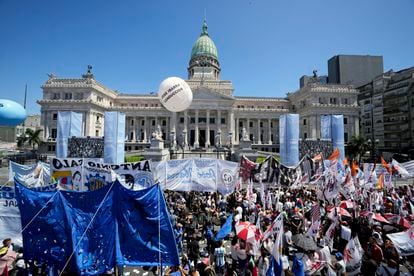The president of Argentina, Alberto Fernández, and the vice president, Cristina Kirchner, this Tuesday. NATACHA PISARENKO (AFP)
The negotiation with the IMF concentrates all the attention on Argentina.
President Alberto Fernández admitted on Tuesday that the agreement to refinance the 44.5 billion dollars that the country received in 2018 is not yet closed, but said that he will send it "this week" for treatment in Congress.
That was the most important announcement of the hour and a half speech that the president gave during the opening of the parliamentary course.
The issue of the debt was also the origin of a scuffle with part of the opposition, which left the room when Fernández reiterated that he will investigate the criminal responsibility of this record indebtedness, produced during the administration of Mauricio Macri.
"Argentine men and women have the right to know how and who was responsible for so much nonsense," he said,
amid great shouting from some and applause from others.
Cristina Fernández de Kirchner, who as vice president presided over the session, listened to him next to her.
Alberto Fernández is a president weakened by the tensions he maintains with Fernández de Kirchner, leader of the main force of the government coalition.
The differences are concentrated precisely in the agreement with the IMF.
Kirchnerist legislators have raised multiple objections to a text that they consider a surrender by the Casa Rosada before the creditor, which calls for a zero deficit within a period of three years and conditions the validity of the agreement to the result of quarterly audits.
Cristina Kirchner has not appeared in public or made statements since the end of January, when the IMF and Fernández announced the start of an understanding.
During the last week, Kirchnerism leaked alleged details of the agreement to the press, which spoke of a labor and pension reform and a rise in public service rates.
The president used a good part of his speech before the Assembly to deny the leak.
"Let it be clear, there will be no labor reform," he said first.
"I want to be very clear before this Legislative Assembly: there will be no pension reform," he added later.
And he repeated several times that the agreement does not imply "an adjustment", a cursed word in Argentina.
"It's an unusual understanding: no adjustment policies and real spending increases in every year of the program," he said.
There will be war, however, on the issue of energy rates.
The Government today allocates 2.3% of GDP (about 11,000 million dollars) in subsidies so that the price of electricity and gas does not rise in households.
It is part of a policy against inflation, which exceeds 50% year-on-year.
Kirchnerism does not want increases of more than 20% in tariffs, but the IMF demands that they at least approach the CPI.
Alberto Fernández said this afternoon that the increases will be tied to the salary index, which far exceeds the aspirations of the former president.
They were all words for Kirchnerism, which threatened to block the agreement in the Senate, where Cristina Kirchner has control, and even in the Chamber of Deputies.
The son of the former president, Máximo Kirchner, resigned in early February as parliamentary leader of the ruling coalition, the Frente de Todos, in disagreement with the text signed with the IMF.
The deputy was not in Congress this Tuesday, evidence of the dimension of the fracture.
Nor was the political group that he leads, La Cámpora, outside the legislative building, accompanying the unions and social organizations that supported Fernández.
Unions and social movements related to the president of Argentina, Alberto Fernández, demonstrate outside Congress, this Tuesday.Natacha Pisarenko (AP)
Tension with the opposition
The president needs the votes of Kirchnerism to approve the agreement with the IMF, a step prior to the definitive signature in Washington.
But he also needs the opposition.
And this Tuesday in the Assembly he broke bridges with the legislators of Together for Change, the coalition of former President Mauricio Macri.
He accused them of promoting irresponsible and unaffordable credit, with annual commitments "unprecedented in the universal history of modern history."
According to the agreement signed with the IMF in 2018, Argentina had to pay this year 19,000 million dollars and a similar sum next year.
When Macri handed over power to Fernández in 2019, the schedule with the IMF was already unfeasible and Argentina was in default with private creditors.
Fernández reminded Together for Change that there is a judicial investigation against those responsible for receiving the credit.
Macri's deputies then left the premises.
It was the hottest moment of the session, to the delight of Cristina Kirchner, a silent witness to the scene.
Fernández was then lost in a long list of economic announcements, most linked to the productive sector, and the review of the indicators that indicate a rebound in the economy in the post-pandemic.
Subscribe here to the EL PAÍS América newsletter and receive all the current regulatory keys in the region.

